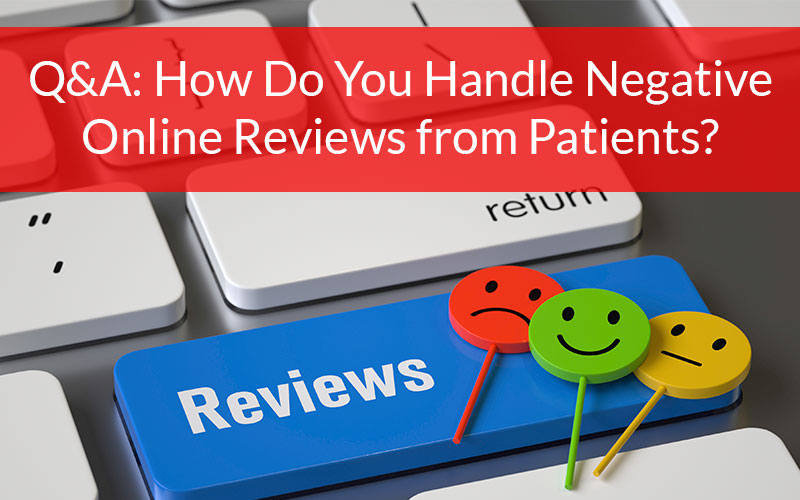Q&A How Do You Handle Negative Online Reviews from Patients?
Gavin Baker, President of Baker Labs will present the webinar “How to Handle Negative Patient Reviews” on January 23, 2019 at 12 noon ET. Here he discusses handling negative online reviews.

Nearly 70% of patients who read healthcare reviews are influenced in the selection of their next physician, hospital or medical practice, according to PwC Health Research and almost 3 out of 4 of adults search online for a doctor.
PwC’s Internet & American Life Project revealed that 72% of internet users say they purposely searched online for health-related information or for a doctor or health professional near them who could best treat their symptoms. Your current and future patients are turning to Google to find your practice, your doctors and to learn about how to get medical help and relief from their symptoms.
The great news is that you are in control of what they find when they search for you. To ensure visitors have a positive experience online when searching for you, pay attention to what is on your website (great pictures and content along with solid patient reviews), how it looks and how easy it is to navigate from a user perspective.
The bad news is that if your website is ugly, hard to use and houses only negative reviews, prospective patients are going to write you off quickly without even physically visiting your office. In this scenario, even a positive word-of-mouth review won’t be enough to compensate for such a lackluster online experience. Remember: Experience is everything, and that goes for online as well as physical visits.
 When it comes to online marketing for your medical practice or clinic, having a functional website and fantastic reviews will only get you so far. You still need to make use of popular social media platforms like Facebook, Twitter and Instagram. By not engaging with prospective patients on these platforms, you are missing out on key connections that could turn prospects into patients. Plus, these platforms give patients another way to express how much they love your practice and your doctors by leaving solid recommendations for their friends and family to see. So, when ramping up your online presence by updating your website and implementing a reviews system, be sure to think through a social media strategy plan that makes sense for your practice.
When it comes to online marketing for your medical practice or clinic, having a functional website and fantastic reviews will only get you so far. You still need to make use of popular social media platforms like Facebook, Twitter and Instagram. By not engaging with prospective patients on these platforms, you are missing out on key connections that could turn prospects into patients. Plus, these platforms give patients another way to express how much they love your practice and your doctors by leaving solid recommendations for their friends and family to see. So, when ramping up your online presence by updating your website and implementing a reviews system, be sure to think through a social media strategy plan that makes sense for your practice.
What if someone says something negative about my practice online?
No practice is perfect and patients will say negative things when leaving social media comments and online reviews. It happens and is beyond your control. What you can control is how you choose to respond to these comments and reviews. We recommend setting up the following as soon as possible:
- Put a system in place to respond to negative comments before they happen and moving these conversations offline to a phone call as quickly as possible.
- Implement a plan to encourage patients to leave reviews for your practice and your providers. This way, you will have a steady stream of positive reviews coming in on a consistent basis, lessening the impact made by any negative reviews.
Understand people leave negative reviews because they are dealing with unmet expectations and want to voice their frustrations. They want to be heard and understood. Responding quickly and in the right way tells that person that you care. Plus, everyone else can see how you effectively deal with negative feedback, so choose your words wisely.
Should I respond to a bad review?
This shows the person who left the review that you are listening and it shows everyone else who sees it that you are as well. Try to respond within 24 hours.
Can I say anything I want when responding to bad reviews?
You need to make sure every response you leave is HIPAA compliant and you aren’t using PHI or even acknowledging that patients are, in fact, patients. Let them know they have been heard and that you want to talk about it. We cover example responses in more detail on our webinar.
Can I stay HIPAA compliant while using social media?
Yes, you can. There are constraints, but as long as you aren’t sharing PHI when it comes to marketing and following best practices, you are educating your patients with health information. Plus, you are actually giving new patients what they want: health information from someone they trust. You should check with your attorney if you have questions or specific areas of concern.
What kind of content should I post on Facebook and where does it come from?
Patients want health information, and they want it from people they know and trust. With our clients, we start with the most common questions patients are asking the nurses, front desk and doctors. Think about it this way: if they are asking you certain questions – they are certainly Googling them as well. This normally falls into questions about symptoms, treatment options, recovery time, pain level and cost. We recommend writing medical blog post articles, recording videos and creating graphics or infographics that describe the timeline or treatment. You can get this content from associations, create it yourself or hire an agency focused on healthcare marketing like Baker Labs to shorten your learning curve.
Why doesn’t my website show up at the top of search results?
Most likely your website hasn’t been updated in years or there is something foundationally wrong with it. Maybe it’s not mobile friendly or it loads slowly. Any and all of these are factors Google uses when showing website pages in search results. The great news is that they can all be fixed — the first step is to figure out why. Check to see if your site is mobile-friendly with this Google tool — and if you want a snapshot of your search engine optimization (SEO) review – you can get a free 30 second report here.
Is online advertising appropriate for my medical practice?
Yes! Google and Facebook do have specific rules to follow when showing ads regarding medical conditions, symptoms and treatments, but as long as you stay inside those rules, you are good to go. The nice part about online advertising is that you are able to focus your ads to be seen by a specific demographic, so, if your practice is comprised of women ages 45-60 within 5 miles of your practice, you can focus your ads to be seen by this group.
Why doesn’t my website work on my iPhone?
Over 57% of website traffic happens on a mobile phone, according to BrightEdge. If your website doesn’t work well it’s most likely that your website isn’t mobile responsive, which is a type of website development that helps your website show up correctly formatted on mobile phones. Check to see if your site is mobile-friendly with this tool from Google.
 Gavin Baker is the President of Baker Labs, a healthcare digital marketing firm. His firm provides strategies and tactics for clients that create modern website designs, increased website traffic, improved search engine ranking, and high-value leads and patients. Gavin additionally is an instructor in social media at the University of Tennessee. Through his teaching, training, and speaking he has shared with thousands of people about social media and digital marketing.
Gavin Baker is the President of Baker Labs, a healthcare digital marketing firm. His firm provides strategies and tactics for clients that create modern website designs, increased website traffic, improved search engine ranking, and high-value leads and patients. Gavin additionally is an instructor in social media at the University of Tennessee. Through his teaching, training, and speaking he has shared with thousands of people about social media and digital marketing.
Be sure to register for our upcoming webinar, tune-in for our radio show starting January 21 on healthcarenowradio.com, and explore our other online resources, such as our online compliance training courses, compliance posters, and our complimentary webinars and podcasts. Be sure to also check out our blog on Social Media Resources for Compliance Officers and Healthcare Professionals: 21 Favorites, as well as our blog on Do You Risk Violating HIPAA on Social Media?

